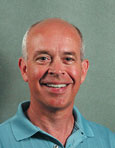
With great pride, the Department of Computer Science and Engineering announces that Lutron Electronics has given Dr. Bruce Weide their esteemed Ruth and Joel Spira Excellence in Teaching Award. This award is given to an individual who excells in teaching and inspiring students and has made significant contributions to field of education. Ruth and Joel Spira founded Lutron Electronics in 1961, two years after Joel invented the solid state dimmer switch.
Weide says he was "humbled by the distinct honor of receiving this prestigious award. Though I realize it's given to an individual, I want to acknowledge my many colleagues, students, and former students, both at OSU and elsewhere, who have contributed so substantially to the ideas and course materials that (I imagine) led to the award. In roughly chronological order based on when I met them, my special thanks go to Stu Zweben, Bill Ogden, Tim Long, Joe Hollingsworth, Murali Sitaraman, Paolo Bucci, Wayne Heym, Steve Edwards, Sergey Zhupanov, Paul Sivilotti, Scott Pike, Nigamanth Sridhar, Jason Hallstrom, and many more I'm sure I'm going to be sorry for not mentioning by name!"
Dr. Weide, who is retiring in June 2013 after teaching and leading for 35 years, has advised or co-advised 28 PhD graduates, though he is equally known for his enduring connection to many undergraduates. Though humble concerning his impact, Bruce is no stranger to awards. His excellent work with students garnered recognition from the Institute of Electrical and Electronics Engineers (IEEE ) Computer Society. In 2000, he was one of the first educators to receive their Computer Science and Engineering Undergraduate Teaching Award, which he received jointly with his recently retired friend and colleague Tim Long. He and Dr. Long also earned the Ohio State College of Engineering Boyer Teaching Award. Individually, he was given the CSE Teaching Award three times and CSE Service Award twice.
Accompanying his work in the classroom, Weide works as a director of the Resolve/Reusable Software Research Group RSRG, a distributed research group with members across the country. The research focuses on component-based software engineering and is currently tackling Tony Hoare's Grand Challenge of a "verifying compiler." This work is grounded in formal specification of functionality and performance, modular verification of correctness and efficiency of implementations, and design of programming languages and systems, while keeping one eye on adaptation of the Resolve research technology to practice.
Prior to joining OSU-CSE (then Computer and Information Science) Weide graduated in 1978 from Carnegie Mellon University with a PhD in Computer Science and in 1974 with a BSEE from the University of Toledo. He recently stepped down from his position as CSE Associate Chair.